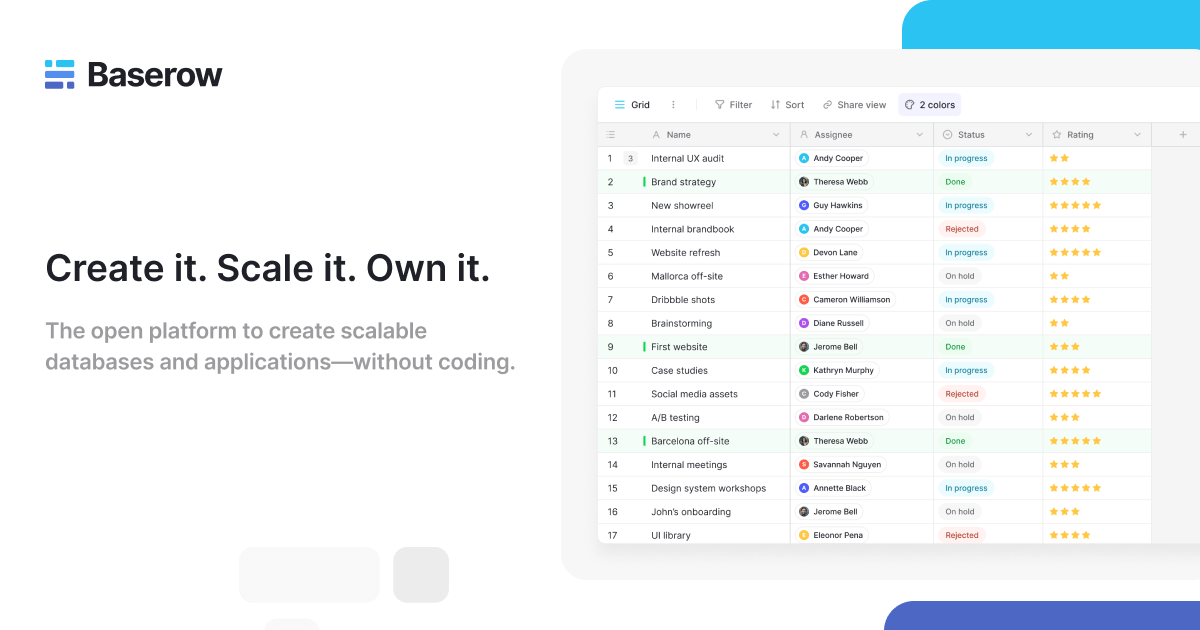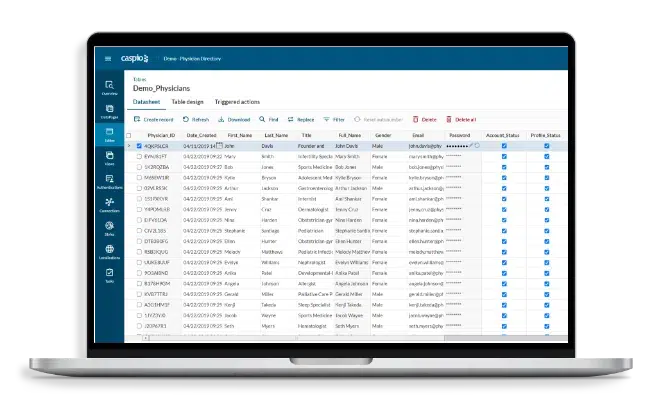No-Code Platforms for Open System Database Development: Save Time and Resources
No-Code Platforms for Open System Database Development: Save Time and Resources
Blog Article
Exploring the Benefits of Scalable Databases That Call For No Coding Abilities for Reliable Data Management Solutions
The development of scalable databases that get rid of the need for coding abilities offers a transformative possibility for companies looking for efficient information management solutions. As we consider the ramifications of such advancements, it becomes critical to check out how they can reshape the landscape of data management and drive lasting growth in a competitive environment.
Enhanced Availability for Users
Enhanced availability for customers is an important element of scalable databases, making sure that information management systems are straightforward and instinctive. In a period where data-driven decisions are critical, accessibility allows a wider series of users, including those without extensive technical competence, to involve with database systems successfully. This democratization of information accessibility helps with boosted partnership throughout departments, empowering workers to make and extract insights informed decisions.
User-friendly user interfaces, such as drag-and-drop attributes and visual information representation, simplify complex data interactions. These improvements reduce the learning curve associated with typical database monitoring, enabling individuals to concentrate on leveraging information as opposed to grappling with technological complexities. Scalable databases typically include real-time analytics and personalized dashboards, supplying individuals with prompt understandings customized to their certain demands.

Cost-Effectiveness and Resource Cost Savings
Reliable data monitoring not just depends upon ease of access yet additionally on cost-effectiveness and resource financial savings. Scalable data sources designed for individuals without coding skills significantly decrease financial problems typically connected with conventional data source administration systems. By getting rid of the requirement for specialized programs knowledge, organizations can allocate their resources more effectively, focusing funds on core company activities instead of extensive training or employing proficient workers.
Furthermore, these databases usually use cloud-based services, which further minimize expenses associated with equipment and upkeep. Organizations can scale their data source solutions according to their requirements, avoiding the costs sustained from over-provisioning resources. This adaptability implies companies can adjust to changing demands without incurring unneeded costs, resulting in substantial long-lasting savings.
In addition, user-friendly user interfaces improve information entry and administration procedures, minimizing the time spent on management tasks. This effectiveness converts right into labor expense financial savings, enabling teams to concentrate on critical campaigns rather than routine upkeep. In general, taking on scalable databases that call for no coding skills promotes an extra economical approach to information administration, enabling organizations to optimize their resources while preserving high levels of functional efficiency.
Improved Cooperation Throughout Teams

Moreover, scalable data sources facilitate smooth communication among employee. With straightforward user interfaces that require no coding skills, workers can conveniently develop, customize, go and share reports or control panels tailored to their details demands. This democratization of information encourages non-technical individuals to contribute understandings, enhancing the collaborative setting.
Additionally, these data sources sustain simultaneous gain access to, permitting multiple users to service the very same dataset all at once. This function improves performance, as groups can participate in joint information analysis without the danger of variation control concerns. The capacity to leave comments or notes straight within the data source additionally advertises discussion and clears up information analyses.
Streamlined Information Administration Processes
In today's data-driven atmosphere, organizations recognize the need of structured information administration processes to make the most of performance and accuracy. By leveraging scalable databases that call for no coding abilities, companies can simplify their data handling and decrease the intricacies typically related to conventional data source systems. This accessibility equips non-technical users to involve directly with data, promoting quicker decision-making and decreasing dependence on specialized IT workers.
Streamlined data management procedures improve process by automating regular jobs such as data entrance, recognition, and reporting. Automated data integration guarantees that information from different resources is aggregated perfectly, removing silos and fostering a linked sight of essential service metrics (no-code). Moreover, user-friendly interfaces enable employees to control data quickly, enabling them to produce understandings that drive strategic campaigns without the requirement for extensive training.
This performance not just speeds up functional procedures however additionally lessens the capacity for human error, ensuring that data remains accurate and trustworthy. Inevitably, streamlined information administration processes with scalable data sources cause improved efficiency, permitting companies to focus on core tasks while advice guaranteeing that their data management practices are reliable and efficient.
Scalability for Growing Services

For increasing enterprises, the capacity to scale up or down is crucial. A scalable database can deal with an increase of information created from brand-new consumers, items, or solutions, guaranteeing that company procedures stay continuous. These databases offer the capacity to take care of peak loads effectively, which is essential throughout durations of rapid development or seasonal spikes.
Furthermore, many scalable database options are designed with user-friendly user interfaces that call for no coding abilities, empowering non-technical staff to take care of information efficiently (no-code). This democratization of data administration allows organizations to allocate resources tactically and decrease dependency on specialized IT employees
Eventually, adopting a scalable data source not just improves operational effectiveness yet likewise promotes an atmosphere where businesses can innovate and progress without the restrictions of conventional database systems. This flexibility positions organizations for long-lasting success in today's competitive landscape.
Verdict
In verdict, scalable data sources that require no coding skills offer considerable benefits for efficient information administration. By enhancing data monitoring processes and supplying scalability for expanding companies, such remedies allow companies to adapt to altering demands efficiently.
Enhanced availability for users is an important element of scalable databases, guaranteeing that data management systems are user-friendly and easy to use.User-friendly interfaces, such as aesthetic data and drag-and-drop features depiction, simplify complicated data interactions. In general, adopting scalable data sources that call for no coding skills promotes a much more affordable method to data management, enabling organizations to see this website optimize their sources while maintaining high degrees of functional efficiency.
By leveraging scalable data sources that call for no coding skills, organizations can simplify their information handling and reduce the intricacies commonly linked with traditional data source systems - no-code.Structured data monitoring processes enhance workflow by automating routine tasks such as information access, validation, and reporting
Report this page